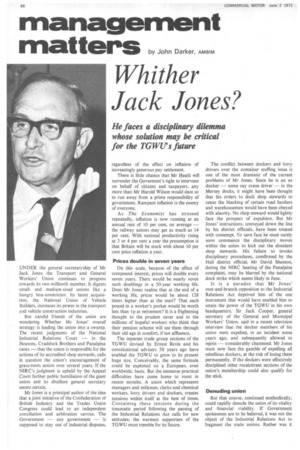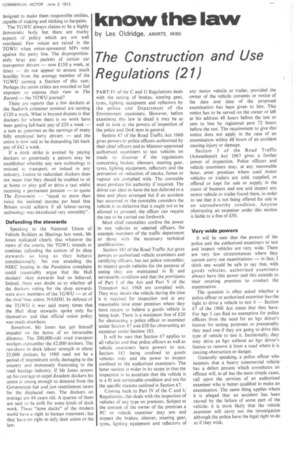management
Page 90

Page 91

If you've noticed an error in this article please click here to report it so we can fix it.
matters by John Darker, AMBIM
Whither Jack Jones?
UNDER the general secretaryship of Mr Jack Jones the Transport and General Workers' Union continues to progress towards its two millionth member. It digests smalland medium-sized unions like a hungry boa-constrictor. Its latest acquisition, the National Union of Vehicle Builders, increases its power in the transport and vehicle construction industries.
But candid friends of the union are wondering Whether Mr Jones' overall strategy is leading the union into a swamp. The recent judgments of the National Industrial Relations Court — in the Heatons, Craddock Brothers and Panalpina cases — that the union is responsible for the actions of its accredited shop stewards, calls in question the union's encouragement of grass-roots action over several years. If the NIRC's. judgment is upheld by the Appeal Court further public humiliation of the giant union and its ebullient general secretary seems certain.
Mr Jones is a principal author of the idea that a joint initiative of the Confederation of British Industry and the Trades Union Congress could lead to an independent conciliation and arbitration service. The Government — any government — is supposed to stay out of industrial disputes, regardless of the effect on inflation of increasingly generous pay settlement.
There is little chance that Mr Heath will surrender the Governient's right to intervene on behalf of citizens and taxpayers, any more than Mr Harold Wilson would dare so to run away from a prime responsibility of government. Rampant inflation is the enemy of everyone.
As The Economist has stressed repeatedly, inflation is now running at an annual rate of 10 per cent, on average — the railway unions may get as much as 14 per cent. With national productivity rising at 3 or 4 per cent a year the presumption is that Britain will be stuck with about 10 per cent price inflation, a year.
Prices double in seven years On this scale, because of the effect of compound interest, prices will double every seven years. There would be nearly seven such doublings in a 50-year working life. Does Mr Jones realize that at the end of a working life, prices would be about 128 times higher than at the start? That each pound in a worker's pocket would be worth less than I p at retirement? It is a frightening thought to the prudent saver and to the millions of hopeful workers who think that their pension scheme will see them through their old age th comfort, if not affluence.
The separate trade group sections of the TGWU devised by Ernest Bevin and his constitutional advisers 50 years ago have enabled the TGWU to grow to its present huge size. Conceivably, the same formula could be exploited on a European, even worldwide, basis. But the immense practical difficulties have come home to roost in recent months. A union which represents managers and milkmen, clerks and chemical workers, lorry drivers and dockers, creates tensions within itself at the best of times. Containing these tensions during the traumatic period following the passing of the Industrial Relations Act calls for new attitudes; the warmest supporters of the TGWU must tremble for its future. The conflict between dockers and lorry drivers over the container stuffing issue is one of the most dramatic of the current problems of Mr Jones. Since he is an ex docker some say crane driver — in the Mersey docks, it might have been thought that his orders to dock shop stewards to cease the blacking of certain road hauliers and warehousemen would have been obeyed with alacrity. No shop steward would lightly face the prospect of expulsion. But Mr Jones' instructions, conveyed down the line by his district officials, have been treated with contempt. To save face he must surely soon commence the disciplinary moves within the union to kick out the dissident shop stewards. His failure to invoke disciplinary procedures, comfirmed by the Hull district official, Mr David Shenton, during the NIRC hearing of the Panalpina complaint, may be blurred by the national dock strike which seems likely in June.
It is a paradox that Mr Jones' root-and-branch opposition to the Industrial Relations Act deprived him of the one instrument that would have enabled him to retain the power of the TGWU in his own headquarters. Sir Jack Cooper, general secretary of the General and Municipal Workers' Union, said in a recent television interview that the docker members of his union were expelled, in an incident some year's ago, and subsequently allowed to rejoin — considerably chastened. Mr Jones must now face the gamble of expelling all rebellious dockers, at the risk of losing them permanently. If the dockers were effectively disciplined other recalcitrant sections of the union's membership could also qualify for the stick.
Denuding union But that course, continued methodically, could rapidly denude the union of its vitality and financial viability. If Government spokesmen are to be believed, it was not the object of the Industrial Relations Act to fragment the trade unions. Rather was it designed to make them responsible entities, capable of making and sticking to bargains.
The TGWU always claims to be a highly democratic body but there are murky aspects of policy which are not well ventilated. Few voices are raised in the TGWU when union-sponsored MPs vote against the party line. The disproportionately large pay packets of certain car transporter drivers — now £150 a week, at times — do not appear to arouse much hostility from the average member of the TGWU earning a fraction of this sum. Perhaps the union critics are muzzled or feel impotent to express their view in The Record— the TGWU journal?
There are reports that a few dockers at the Seaforth container terminal are earning £120 a week. What is beyond dispute is that dockers for whom there is no work have been getting fall-back pay of £20 a week — a sum as generous as the earnings of many fully employed lorry drivers — and the union is now said to be demanding fall-back pay of £42 a week.
If a dock strike is averted by paying dockers so generously a pattern may be established whereby any new technology is resisted in transport, or indeed in any industry. Justice to redundant dockers does not mean that they should be enabled to sit at home or play golf or drive a taxi whilst receiving a permanent pension — to quote The Economist — "equal to more than twice the national income per head that Britain could achieve if all labour-saving technology was introduced very smoothly".
Defending the stewards
Speaking to the National Union of Vehicle Builders at Hastings last week, Mr Jones indicated clearly that whatever the views of the courts, the TGWU intends to continue defending the actions of its shop stewards so long as they behave constitutionally. No one attending the NIRC hearing in the Panalpina complaint could reasonably argue that the Hull dockers' shop stewards had so behaved. Indeed, there was doubt as to whether all the dockers voting for the shop stewards were even members of the TGWU — or of the rival blue union, NASDU. In defence of the TGWU it was said many times that the Hull shop stewards spoke only for themselves and that official union policy was made elsewhere.
Somehow, Mr Jones has got himself impaled on the horns of an intractable dilemma. The 200,000-odd road transport workers outnumber the 42,000 dockers. The run-down in dock labour strength to about 25,000 dockers by 1980 need not be a period of intermittent strife, damaging to the country and immensely frustrating to the road haulage industry. If Mr Jones screws up his courage to expel dissident dockers his union is strong enough to demand from the Government fair and just resettlement terms for the displaced men. The dockers on average are 44 years old. A quarter of them are said to be unfit for some kinds of dock work. These "lame ducks" of the modern world have a right to human treatment; but they have no right to defy their union or the law.
















































































































































